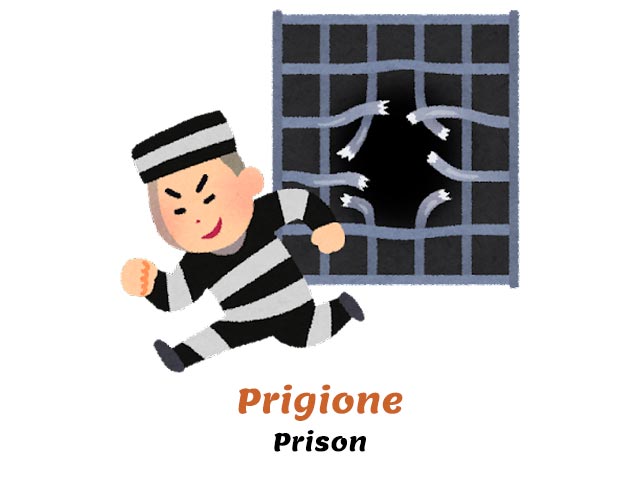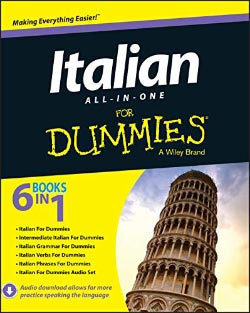What are the Italian masculine nouns? How do you distinguish them from feminine nouns?
Tavolo
Table
Cielo
Sky
Giornalista
Journalist
Prigione
Prison

In this lesson, you’re going to learn all you need to know about them!
Italian masculine nouns
As you probably already know, Italian nouns can be either masculine or feminine.
Usually, nouns for males and male animals are masculine, while nouns for females and female animals feminine.
Uomo and bambino, for example, are masculine.
Uomo
Man
Bambino
Male kid
And donna and bambina are feminine.
Donna
Woman
Bambina
Female kid
For all other nouns, it’s not nature that determines gender. It’s the grammar itself. Most of the time, you can guess the gender of an Italian noun by its last letter, which makes Italian masculine nouns easy to recognize. Let’s see why.
Italian masculine nouns ending in -o
The vast majority of Italian masculine nouns end in -o. Very few feminine nouns end in -o.
| Masculine noun | English |
|---|---|
| Vaso | Vase |
| Quadro | Painting |
| Muro | Wall |
| Foglio | Sheet of paper |
| Libro | Book |
| Albero | Tree |
| Telefono | Phone |
Il muro è alto.
The wall is high.
Mi serve un foglio bianco.
I need a white paper.
Potresti prendere il telefono?
Could you pick up the phone?

Masculine nouns in Italian are usually preceded by a masculine definite article or a masculine indefinite article.
Italian masculine nouns ending in -e
Italian nouns ending in -e can be either masculine or feminine, and some are indistinguishable.
Serpente
Snake
Would you be able to say if serpente is masculine or feminine?
In fact, one of the nouns that you’ve seen right at the beginning of this article is a feminine noun: prigione.
We say il serpente, with a masculine article, because the noun is masculine.
And we say la prigione, with a feminine article, because the noun is feminine.
Other masculine nouns ending in -e are…
| Masculine noun | English |
|---|---|
| Cane | Dog |
| Elefante | Elephant |
| Pane | Bread |
| Ponte | Bridge |
| Scorpione | Scorpion |
Title: Italian All-in-One For Dummies
Language: English / Italian
Publisher: For Dummies
Pages: 672
Learn to speak Italian like a native? Easy.
Italian All-in-One For Dummies appeals to those readers looking for a comprehensive, all-encompassing guide to mastering the Italian language. It contains content from all For Dummies Italian language instruction titles, including Italian For Dummies, Intermediate Italian For Dummies, Italian Verbs For Dummies, Italian Phrases For Dummies, Italian Grammar For Dummies, and Italian For Dummies Audio Set.
L’elefante è un animale che ha un’ottima memoria.
The elephant is an animal with an excellent memory.
Ti piace il pane fatto in casa?
Do you like homemade bread?
Il ponte è stato costruito in due mesi.
The bridge was built in two months.
You will need to memorize the gender of words ending in -e that have an unpredictable gender that cannot be inferred from the context, because sometimes you will be able to guess the correct gender by the meaning of the noun itself.
Let’s see how.
Italian masculine nouns ending in -ale, -è, -ile, -one and -ore
Nouns ending in -ale, -è, -ile, -one and -ore are usually masculine.
| Masculine noun | English |
|---|---|
| Canale | Channel |
| Caffè | Coffee |
| Bacile | Basin |
| Limone | Lemon |
| Onore | Honor |
| Dolore | Pain |
Bevo sempre il caffè a colazione.
I always drink coffee when I have breakfast.
Taglia questo limone a fette, per favore.
Please slice this lemon.

Italian masculine nouns ending with a consonant
Italian nouns that end in a consonant are usually loanwords from other languages. Almost all foreign words are masculine.
| Masculine noun | English |
|---|---|
| Computer | Computer |
| Yogurt | Yogurt |
| Hotel | Hotel |
| Film | Film |
| Bar | Bar |
Lavoro al computer.
I work at the computer.
Mangio sempre uno yogurt dopo cena.
I always eat yogurt after dinner.
Hai visto quel nuovo film?
Have you seen that new movie?
Job titles in -iere and -ore
All Italian words that describe job titles that end in –iere and -ore are masculine, because they refer to males doing the job.
| Masculine noun | English |
|---|---|
| Pittore | Painter |
| Barbiere | Barber |
| Attore | Attrice |
| Pompiere | Firefighter |
| Cameriere | Waiter |
| Muratore | Construction worker |
| Professore | Professor |
Mio papà fa il pittore.
My dad is a painter.
L’attore sta studiando il copione.
The actor is studying the script.
Ho sempre sognato di fare il professore.
I’ve always dreamed of becoming a professor.

Job titles ending with -ista
Words ending in -ista that refer to job titles can be either masculine or feminine, depending on the biological gender of the worker.
Take giornalista, for example. It can be a masculine noun (il giornalista, the male journalist) when you’re talking about a man and a feminine noun (la giornalista, the female journalist) when you’re talking about a woman.
| Masculine noun | English |
|---|---|
| Giornalista | Journalist |
| Barista | Bartender |
| Artista | Artist |
| Musicista | Musician |
| Velocista | Sprinter |
Il giornalista parla al microfono.
The journalist speaks into the microphone.
L’artista dipinge un quadro.
The artist paints a picture.
Masculine nouns ending in -a
Since -a is the main feminine ending in Italian, you won’t find many masculine nouns ending with this letter. There are very, very few of them.
| Masculine noun | English |
|---|---|
| Clima | Climate |
| Sistema | System |
| Problema | Problem |
| Amalgama | Mixture, combination |
| Poema | Poem |
Com’è il clima a Roma?
What’s the climate like in Rome?
Huston, abbiamo un problema.
Huston, we have a problem.
And that’s the end of our guide to the Italian masculine nouns! If you still have any doubts, feel free to leave a comment.
Now what?
Now that you’ve seen how the Italian masculine nouns work, you might want to keep learning Italian online with these free Italian resources:
- Useful Italian Words Series
- Common Italian Phrases Series
- Italian grammar lessons and tricks
- Italian idiomatic expressions
Or you might also want an excellent offline Italian grammar resource to take with you at all times (Amazon).
❤️ If you liked this guide on the Italian masculine nouns, consider sharing it with your social media friends who are also studying Italian.




